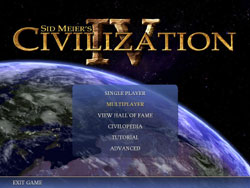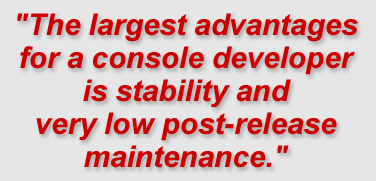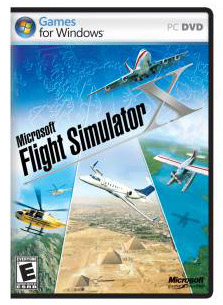Counterpoint View to Dart’s Commentary on DRM
by Guest Writer Helmut “RSColonel_131st” Skrdla
Introduction
Recently, SimHQ published a fairly balanced and even-handed commentary by Frank “Dart” Giger on the subject of Digital Rights Management, especially as it relates to games and simulations. In my humble opinion, Dart did an excellent job of pointing out the Pros and Cons of DRM, and what he personally accepts and doesn’t accept, in a honest and objective manner.
Yet Dart is currently flying two simulations – DCS: Black Shark and Rise of Flight – which use DRM solutions considered by other people already too excessive in it’s restrictions. I’m one of these users, and I wanted to provide the “other end of the spectrum” counterpoints to Dart’s commentary, thanks go to Doug for providing me that opportunity here.
Do I Own the Games I Paid For?
This is really the core of the question for me, and many others as evident by the large volume of discussion in SimHQ’s dedicated DRM Forum: Do we (any longer) own the games we paid for?
Now to be clear, on legalese terms, we NEVER owned any game we bought. We as consumers always buy a license to use software and never the intellectual property, usually exclusive (as in, only for you personally, a single license, perpetually, that is to say “forever”) and I’m perfectly aware of that.
But in the not so distant past, this was a formality. In actual fact, if you bought a game on disk, didn’t scratch the disk up (for which you also might be able to get a replacement following the procedure arranged by the publisher) and kept a computer around running the correct operating system and supported hardware, you could easily play the same game for six to eight, even ten years after release. With the “compatibility modes” and tools introduced in Windows XP, running older games was made even easier.
It’s no secret many legal buyers of games also resort to using “no-CD” modified executables so they can store their CD/DVD disks safely away. Multiple game publishers were tolerant of the “no-CD” capability (even if it did violate the DMCA) as long as they had received your money at point of sale. Ubisoft even promoted the “no-CD” solution itself to resolve an issue with their own DRM they had introduced in a Rainbow Six: Vegas 2 patch. Some publishers even removed the disk check after a certain time (Bohemia Interactive for example) or – ironically enough – actually patched the disk check out fairly quickly when it caused problems running the game (Ubisoft and LOMAC v1.02 comes to mind).
So, short of running off old hardware to keep a legacy system around, nothing could take away your ability to run the games you bought, for as long as you wanted.
Also, as long as your system was booting up, had no hardware or software troubles on it’s own, you could always the play your games, anytime, wherever, whenever you wanted.
Additionally, you always had the right to sell a game you no longer found interesting – just give the packaging, CD and maybe included CD-key to the buyer and you were done.
Times Are Changing – for Better or Worse?
But these “habitual rights” – as in “things we were used to be allowed to do” are going away quickly. Obviously piracy has exploded with the propagation of high-speed internet lines, and digital entertainment is copied merciless by groups of all ages. The publishers saw an understandable and justified need to react, and invented “DRM”. I say “invented”, because in the past a disk-check was merely “Copy Protection”, but the new DRM tools – while being mainly touted as a more efficient copy protection – can do much more than just keep you from copying software – they can define when, on which computer, for what time you can access all or parts of the game. iTunes for example, before going DRM-free, only allowed you to listen to your music on five registered devices at a time, something that the old game copy protections never could do. New business models came into being – like subscriptions to music services, where you can only listen to the files on your hard drive as long as you are paying a monthly or yearly fee. That is the core difference between Copy Protection and Digital Rights Management – DRM keeps watching what you do with the stuff you bought long AFTER the sale.
And that is the core of the problem to answering the question raised above.
The Rise of DRM
My memory may not be complete, but as I recount it, Microsoft XP was the first private customer software (there may have been business-class applications earlier doing it already) to use an online connection or phone connection to tie the product with your computer in a central server. Initially it caused an outrage – I was already working in IT back then and remember well the stink this caused at my company. People gradually got used to the process and in truth, it never proved to be a real bother.
Office XP then became the first customer level application that used the same method, and here already it became clear that it wasn’t quite such a clever solution – for example, if you bought it for a specific user who switches laptops two weeks later, suddenly you couldn’t install his Office copy again since it was already registered with his previously damaged laptop and would take a few weeks or months (I never figured out the exact time) before you could reinstall it elsewhere.
These things slowly made their way into gaming software – Half Life 2 on Valve’s Steam Distribution system and Flight Simulator X by Microsoft I remember as the first games to require an online activation, at least once for each install after which you could run it “offline” for as long as you wanted.
Now, the fascinating thing (at least for me) was to watch the user response to these systems. While initially WinXP and OfficeXP had caused some outcry for using new methods, these solutions used on entertainment software did cause considerable fewer torch wielding riots in the Internet. Never mind that Steam had a lot of initial launch problems, and people often were left unable to activate and play their paid-for games due to server overload. Arguably, it offered a few advantages over conventional disk check copy protection – digital distribution, automatic updates – and the game was simply “too hot” for a lot of players to turn away from it. But clearly the launch didn’t go smooth, yet it was a financial success and people quickly got used to having to activate their games.
Screwing the Lid Tighter – Until It Breaks
Somehow though, the invention of such DRM solutions didn’t magically stop gaming piracy. Pirates had been able to get around disk checks, and they quickly became able to get around encrypted game files and similar methods used by Steam.
So the industry slowly introduced ever more and more restrictive DRM, in their ever on-going fight against piracy (one is reminded of the armor/gun caliber matches in early naval development). Nowadays, we have reached a level where games might break hardware functionality (as seems to have been the case with early versions of overly aggressive StarForce), only get limited activations per CD-Key (as in DCS: Black Shark, for example) or require a constant online connection even if you are playing offline against the computer (as inRise of Flight).
For me and others, this is clearly going too far. It’s not that I don’t want the publisher and developer to make money of their hard work, but not at the cost of functionality from my paid-for games. Lets look at the “rights we used to have” outlined above and compare what today’s situation leaves us with.
1) No longer can you be assured to be able and run a game for as long as you can keep a suitable legacy machine around. It’s not at all uncommon for flight sims to last six or more years with an active user base (look at Red Baron 3D, Longbow II,Enemy Engaged, Flight Simulator 2004 as a few examples that immediately come to mind), and it’s pretty easy to maintain a legacy machine for six-to-ten years that is able to run these old titles. The reason they saw such a lifespan was the lack of a suitable replacement product, so it’s not as if players would not simply have moved to the next best helo or WW1 sim.
But today, if the company running the servers that activates your software after reinstall goes out-of-business 2 or 3 years after their last major success (which isn’t a totally unlikely scenario) you might be left sitting with a “coaster” long before your game reached the end of it’s useful life. Would such companies be able to develop a last patch and do away with the activation requirements? Valve says yes, that’s what would happen for all Steam titles – smaller publishers might not have the time or resources anymore if they are filing for bankruptcy, or might not legally be allowed to “give away their assets” like that. neoqb’s Terms of Use on their web site (which also relates to the game, as far as I read them) you will find the paragraph 4.7 saying “Operator has the right to unilaterally and at any time limit, extend, modify or terminate the provision of services with the notification of the User on the Resources of the Operator.”
For any online-activated title it’s fair to conclude that the new risk is the useful lifespan of your software being tied to the lifespan of the publishing company. And the later might be quite a bit shorter than the former. For me, this risk is not about “losing” $40 after two years (which would be dirt cheap per game hour), but about time spent learning a sim well, maybe modding it to perfection, “falling in love” with it – just to maybe have it suddenly quit on me.
2) You might not be able to play the game when you happen to have time for it. I remember quite a few scheduled Red Orchestra matches with my friend Luke, where I had to stay out due to Steam’s inability to launch it. “Game currently unavailable, please try again later” got my blood boiling. In each of these cases, the outage wasn’t very long but enough to destroy my gaming plans for the evening, and if you have a lot of real life obligations, carefully scheduled gaming time is at a premium anyway. Often the cause of problems is not even with your Internet Service Provider (ISP) or with the Servers from the publishing company, but can be anywhere in between one of the many interconnected “hops” that international Internet traffic goes through. There is practically zero chance for either you or the publisher to fix such an issue (neither you, nor the publisher, nor even your ISP or their ISP might have a direct contract with the company actually at fault), all you can do is to wait for the intermediate service provider to fix himself. At least one such instance of exactly that is recorded in the RoF technical support boards here.
3) As Copy Protection and DRM becomes increasingly more complex (and is often a separate development process from the main game) the chances of things going wrong on the software and hardware side increase unnecessary. Every layer of software complexity introduces new potential problems. For example some users of Flaming Cliffs are not able to run it on the current Windows 7 release candidate since the copy protection hasn’t been patched to support W7. Other users with a different Flaming Cliffs version can run it just fine since it’s including a later version of copy protection. Obviously getting bug-free games out the door was never an easy task given the variance in different systems and configurations, and copy protection is adding more overhead likely to cause problems – without any benefit to the user experience.
4) Companies using online-based DRM would be able to change the business model “on the fly” if they chose to do so, especially if they included such a possibility in the EULA. If it came to litigation, would it hold up? If a game becomes unprofitable, and the infrastructure to activate and handle user accounts too costly, publishers might well be tempted to request their customers pay a one-time extra fee for the next few years of running the necessary background servers – otherwise the game dies, since they put in their EULA that they can shut down the “service” anytime. They could also introduce “pay-to-play” for online or even offline time, otherwise threatening to shut down your license. The development of the game and any additional costs is entirely in their hands, and they will claim that it’s all written in the EULA anyway, so it is not in question.
5) Mandatory registration and mandatory patching is included with some kinds of DRM. The former means the publisher gets a very valuable (if just for its own marketing use) database of user-specific information. That can include interests, geographic location, mail address down to hardware used. Steam for example, collects hardware stats supposedly anonymous. This means you as the person who bought the software can not longer decide yourself what patches / updates you want – and don’t want – to use. If the publisher rolls out in-game advertisements with an update (as happened in aSWAT4 add-on), or other content you don’t agree with, you can not decline the patch since that would leave your game unable to “logon and play”. Not to mention that some users might prefer to download a 500MB patch where and when they want (maybe at work) and keep playing the previous version meanwhile, instead of having to sit through a 500MB update when all they wanted was just a quick flight with their friend who just came up on ICQ.
6) Resale of games becomes increasingly problematic. Valve is charging a small sum to transfer games to a different Steam account. For Rise of Flight, the latest word from North America publisher 777 Studios in the SimHQ RoF Forum is “neoqb will not support used copies in any way”. Read this discussion about reselling and the RoF Terms of Sale (EULA).
Now, as I pointed out in that forum thread – this may be true and well for the US release, but many European countries (Germany for example) actually have laws that regulate what an Intellectual Property Holder (Developer or Publisher) can do and can’t do with his software after initial sale. Microsoft lost in court against a German company reselling used licenses because of that particular legal paragraph discussed in the thread.
Written Law vs. Practical Reality
The last point leads us to a different problem coming up with DRM – the dichotomy between what customer law says, and what companies can make the user do.
I’m not a lawyer, but in my position as IT Manager of a fairly large company I’ve had enough reason to educate myself as much as possible on such things here in Austria. As far as I personally understand EU Law, when you buy software, you have the same right to a “product working as advertised” as if you bought a lawn mower or coffee machine from the same store.
Yet, if you come home, install the software (on a system meeting the minimum requirements) and you can’t run it because the online activation doesn’t come through – can you return it? Nope. Most stores will not accept opened software.
If the software doesn’t load every now and then since the logon server is down (not your fault), then it isn’t working as promised – comparable to a lawn mower which refuses to start every other weekend – but while you can return the lawn mower and make a stink in the store about it so they get it fixed, you can’t do that with software. Yet it should be your basic right as a customer and you certainly aren’t out-of-line for either expecting a working product or a refund, as is the rule in all other areas of buying/selling we daily see. The EU is actually looking into specifying laws to mandate that software must do exactly that – work as advertised for x amount of years – so somewhere someone is definitely aware there is a problem.
Same dichotomy applies to the matters of resale – the German “Erschöpfungsgrundsatz” basically says (according to my layman’s reading of the German text here that once someone sold a product or a mass-copy of an intellectual product, they can not further regulate or inhibit the resale of that product done by the first direct customer. But companies – which by and large despise the second-hand game market – are not afraid to put clauses to the contrary – and technical blocks – in their game releases, since ultimately no single user has the funds necessary to take such things to court, and so the issues continue to exists in a grey legal area (common to all fast-developing technology today) which hasn’t been tested in a court-of-law as of yet.
But Without DRM, the Industry Can’t Survive?
That is the one argument I always get to hear in defense of new DRM solutions. Somehow, smaller companies (neoqb comes to mind) seem to be “especially protected” by this counter argument. In my opinion, I doubt Microsoft, Ubisoft or Electronic Arts would use the same excuse or in fact get away with making their customers jump through the same hoops.
And it just isn’t true. First, there are ways of Copy Protection (not DRM) which work well (Steel Beasts 2 PE comes with an effective USB dongle) but has nearly none of the downsides of online based DRM. Yes, SB2PE sells for $125 USD, and part of that is the dongle cost, but if more companies agreed to use the same base hardware, prices would fall considerable. And personally, I’d rather pay $100 for a DRM free (maybe even dongle-free) software than $40 for a restricted one.
Even a regular disk check seems to often protect the critical first three months of sales well enough, especially if the game is patched two or three times in the process. Pirates would always be lagging behind.
Since most of the money is made early after launch, there’s no reason why DRM can’t be removed a year later, often when a pirated version is already circulating anyway. This happened to the original Armed Assault.
Other games – even though squarely “AAA Pirate Material” don’t use DRM at all. Fallout 3, maybe the best RPG of 2008, has a disk check only on the launcher executable required to setup the game. The actual game executable runs without a disk – out of the box. No hacks needed. I recently bought two Third Wire flight sims just because they use no DRM at all. In fact, “DRM Free” might become a new marketing buzzword.
iTunes now has moved to “watermarked” MP3 files – encoded with your unique UserID, so if they show up in the torrents, Apple will hunt you down easily enough. But they play on every device, forever, no net connection required to “activate”.
I’m ultimately convinced there are good ways to protect developer/publisher investment WITHOUT time bombing the software or making the legal customer suffer more than the kiddies who run cracked pirated versions. But often it seems companies prefer to take the easy conventional way – pack in as strong a DRM as possible, leave it forever in the game, with the added benefit of data mining your user base that way – instead of the creative approach.
The music industry has already learned the hard way that DRM didn’t work for them, and found better ways to treat their legal customers. I’m sure once the first major logon-server crashes or the first major flight sim company is forced to shut down their activation servers early (to me, a matter of “when” – not “if”) users who are currently positive and defensive about DRM in any shape will learn the same thing the same hard way, and the industry might again start to care more about their customers than about the pirates – many of which never will become customers anyway, no matter how often we hear that each pirated copy is a lost sale.
Additional Reading
Three exemplary stories regarding the pitfalls of DRM:
Walmart to shut down it’s music store license servers
Amazon remote-deletes already paid-for eBooks from its Kindle reader
Users unable to play Empire Total War posting about their problems with Steam
![]()
Helmut’s opinions are his alone and do not necessarily represent the viewpoint of SimHQ or it’s staff, and does not represent an official opinion and policy of SimHQ.
We want your Feedback. Please let us know what you thought of this article here.


















